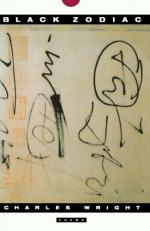|
This section contains 483 words (approx. 2 pages at 300 words per page) |

|
SOURCE: A review of Black Zodiac, in World Literature Today, Vol. 71, No. 4, Autumn, 1997, pp. 794-95.
[In the following review Oser praises Wright's use of language in Black Zodiac.]
For an avowed ascetic, Charles Wright's work is curiously inspissated: thick and intense. He is a master of spiritual bricolage, an heir to the eclecticism of Emerson, Whitman, Eliot, and Pound, but with an existential darkness that threatens to overwhelm the page. His spiritual resources include Christianity with its liturgical seasons, deism (Monticello looms nearby), Chinese Buddhism, mythology, and all sorts of literature—a scholia-poem called "The Lives of the Saints" quotes Raleigh, Stein, Stevens, Dante, Bertran de Born, and Robert Graves. He fluctuates among modes and moods—here gnostic, there dolorous Jesuit—an improvising contemplative who knows that to play is to live, and who plays, in the American tradition, seriously—indeed, rather self-absorbedly. Inevitably, he appears as a...
|
This section contains 483 words (approx. 2 pages at 300 words per page) |

|


